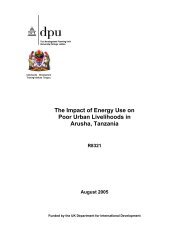EPA Review Annex Documents - DFID
EPA Review Annex Documents - DFID
EPA Review Annex Documents - DFID
You also want an ePaper? Increase the reach of your titles
YUMPU automatically turns print PDFs into web optimized ePapers that Google loves.
eally erodes the preferential treatment offered to LDCs. The recent EU South Korea Agreement<br />
exemplifies this point. While the EU market is progressively opening up its market for<br />
developing countries like South Korea, unless LDCs like Ethiopia are supported technically and<br />
financially to improve their supply side problems and competitiveness it is certain that the<br />
market access through agreements such as EBA or GSP will remain meaningless.<br />
By concluding an <strong>EPA</strong> as it is, the EU will surely benefit by securing at least 80% preferential<br />
market. However, for many LDCs unless the <strong>EPA</strong> take due consideration for development the<br />
<strong>EPA</strong> would be considered failure. Of course, the need for development support has been a<br />
contentious issue from the start of the <strong>EPA</strong> negotiations. Ethiopia emphasised its “no<br />
development no <strong>EPA</strong>” position by stressing on the need for further resources and<br />
compensation for possible loss of revenue as a result of opening up markets and entering into<br />
additional commitment. However, the EC has repeatedly maintained its inflexible position that<br />
development component is provided under the EDF, and has reiterated that additional financing<br />
that would be available from individual EU member states as Aid for Trade. The EC also argue<br />
that development is about more than just the money available as countries signing <strong>EPA</strong>s would<br />
benefit from the lock-in effect that would signify a more stable investment climate and result in<br />
higher levels of inward investment.<br />
The challenge faced now upon the conclusion of the full ESA <strong>EPA</strong> is on how to introduce the<br />
development component, through improved market access and development support to make<br />
the <strong>EPA</strong>s a true development tool. If this does not occur then it is certain that countries like<br />
Ethiopia will not be able to take advantages promised in the full benefits of <strong>EPA</strong>s.<br />
From the perspective of Ethiopia the <strong>EPA</strong> was considered pro-development from the outset.<br />
The belief was that it would enhance its development endeavours and was not a mere market<br />
access arrangement. This goes some way in explaining why Ethiopia tried to make its position<br />
clear by saying “No development no <strong>EPA</strong>” from the initial stages. Ethiopia maintains its<br />
position on the need to explore further how to elevate the development dimension component in<br />
the negotiations. The <strong>EPA</strong> should take care of this.<br />
Box-3:- Trade Related Issues<br />
Negotiations on the trade related issues in general are still young; both sides (ESA and EC)<br />
are still in the process of articulating the scope and level of ambition of their proposals. For<br />
example, with regard to intellectual property, ESA has provided preliminary comments on<br />
the EC proposal indicating the primary concerns that the proposal is TRIPS-plus and lacks<br />
asymmetry. On competition policy, the EC side has presented its main objectives with<br />
respect to the content of the <strong>EPA</strong>. Both sides have agreed that further discussions are<br />
needed on issues such as nascent industries, monopolies and anti-competitive practices.<br />
ESA continually underlines and is insisting on the need to have technical assistance in this<br />
area. Regarding transparency in public procurement, both sides have presented their<br />
respective positions. ESA has highlighted the challenges faced by its member states on<br />
this area. Ethiopia’s position in most trade related issues has been in line with the regional<br />
position, basically cooperation in capacity building, simplifying rules and procedures in<br />
these areas.<br />
107
















